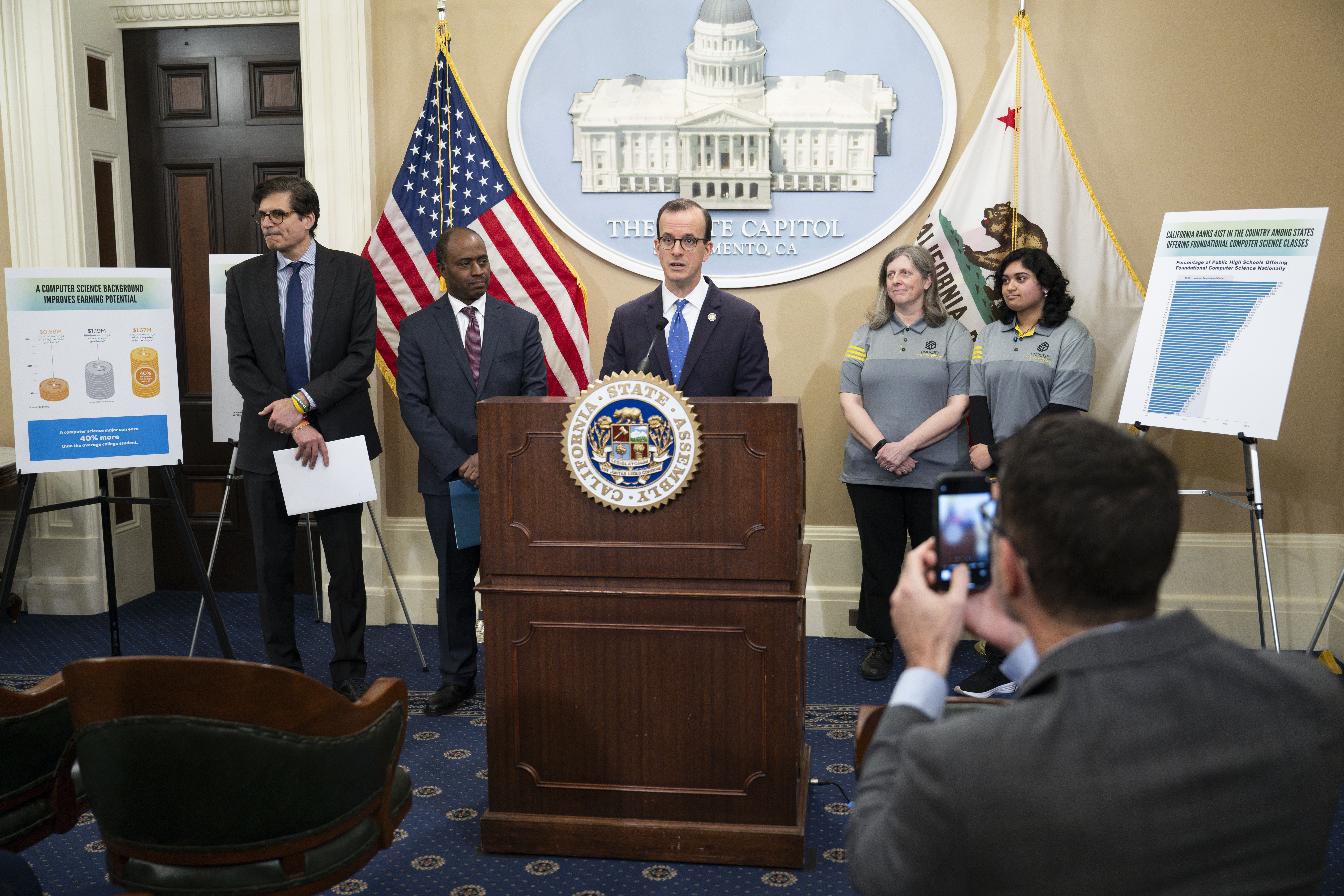Bill will Require Every Public High School to Teach Computer Science and Establish Computer Science as a High School Graduation Requirement

SACRAMENTO – Today, Assemblymember Marc Berman (D-Menlo Park) and State Superintendent of Public Instruction Tony Thurmond unveiled legislation to expand access to computer science education in California by requiring that all public high schools in California offer at least one computer science education course. The bill, AB 2097, also establishes computer science as a high school graduation requirement by the 2030-31 school year.
“It is critical to equip our students with the skills they need to enter the 21st century workforce and succeed in our digitally driven world,” said Assemblymember Berman. “Computer science skills are needed in many career fields, from science and technology to agriculture, entertainment, fashion, banking, marketing, and beyond. We owe it to our students to teach them the fundamental skills they need to succeed in tomorrow’s economy – and that starts with having access to a computer science education.”
“Even in Silicon Valley, too many students who grow up in the shadows of global tech companies are not gaining the skills they need to one day work at those companies. Not only will AB 2097 help provide the workforce needed for California to remain competitive with other states and other nations, but it is also crucial in closing the existing gender and diversity gaps. If we truly value equity in our schools, we need to ensure all students have access to computer science education,” continued Assemblymember Berman.
“I am proud to co-sponsor this bill to make computer science a high school graduation requirement in the state of California. It is necessary that we equip our young people with the essential skills needed to thrive in careers of today and tomorrow. Our state has long been the home of some of the greatest technology founders and innovators, and all of our students should be empowered to contribute to and benefit from that success. Computer science is foundational and imperative for all of our students to become productive, responsible digital citizens in a global society,” said State Superintendent of Public Instruction Tony Thurmond.
State Senator Josh Becker and Assemblymember Lori Wilson are principal coauthors of AB 2097.
Despite being the undisputed cradle of innovation, California has for too long failed to offer students from all backgrounds access to computer science courses, falling well behind 40 states and leaving a growing equity gap.
As of January 2023, California has 45,245 open computing jobs that have an average salary of $153,544, yet there were only 9,339 graduates in computer science in 2020. California has the highest number of open computing jobs in the country.
“Many students have no idea what they can do with computer science skills until they take my classes and realize how many doors start to open up,” said Modesto Computer Science Teacher Amy Pezzoni. “As a teacher, I love creating opportunities for my students to learn skills that will really serve them throughout their lives. We need to demystify computer science and embrace the fact that having skills in this field will serve our students in almost any job that they seek. That’s why we need to ensure that every student has access to these classes, regardless of where they are from.”
Media Feed
Assemblymember Marc Berman and State Superintendent of Public Instruction Tony Thurmond Unveil AB 2097 to Guarantee Access to Computer Science for All California Students
Downloadable Link: https://vimeo.com/910575823/6655db36e8?share=copy
Audio Feed:
Opening remarks from Assemblymember Marc Berman. (3:10) https://asmdc.org/sites/caucus.asmdc.org/files/audio/BermanComputerScienceEdActBermanRemarks.mp3
Asm Berman says California is falling behind other states when it comes to computer science education. (:32) https://asmdc.org/sites/caucus.asmdc.org/files/audio/BermanComputerScienceEdActBerman1.mp3
Asm. Berman says his legislation will equip the workforce of tomorrow. (:31) https://asmdc.org/sites/caucus.asmdc.org/files/audio/BermanComputerScienceEdActBerman2.mp3
Closing remarks from Asm. Berman. (1:44) https://asmdc.org/sites/caucus.asmdc.org/files/audio/BermanComputerScienceEdActBermanClosingRemarks.mp3
Entire news conference including audio from (in order of appearance): Asm. Berman, State Superintendent Tony Thurmond; Modesto Computer Science Teacher Amy Pezzoni, Computer Science Student Ritika Chaudhari
and State Senator Josh Becker. (24:41) https://asmdc.org/sites/caucus.asmdc.org/files/audio/BermanComputerScienceEdActNewsConference.mp3
FAST FACTS ON COMPUTER SCIENCE:
- Twenty-seven other states currently require high schools to offer a computer science course, with five of those states requiring a computer science course for graduation.
- Twice as many Americans use computer skills in their jobs than previously reported, and half of those are in non-STEM fields, such as agriculture, fashion, and banking.
- As of January 2023, California has 45,245 open computing jobs that have an average salary of $153,544, yet there were only 9,339 graduates in computer science in 2020.
- Fifty-five percent of high schools in California do not offer a single course in computer science.
- Just 5 percent of the 1,930,000 high school pupils in California are enrolled in a computer science course.
- Only 34 percent of schools serving high proportions of Black, Indigenous, Latinx, and Pacific Islander pupils offer computer science courses, compared to 52 percent of schools serving a greater proportion of White and Asian pupils.
- While female pupils comprise 49 percent of the high school population, just 30 percent of pupils taking computer science courses are female.
- Schools serving low-income communities are three times less likely to offer core computer science courses, and over two times less likely to offer Advanced Placement courses, than schools serving high-income communities.
- Rural schools are two times less likely to offer computer science courses than urban schools.
- California lags behind the national average, and behind 40 other states, in the percentage of high schools offering at least one computer science course.
Contact: bermanpress@asm.ca.gov